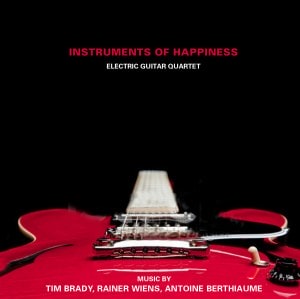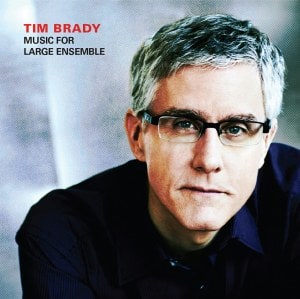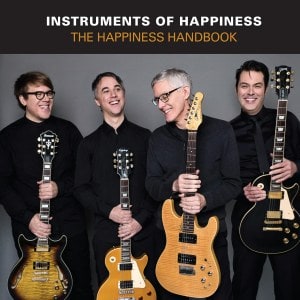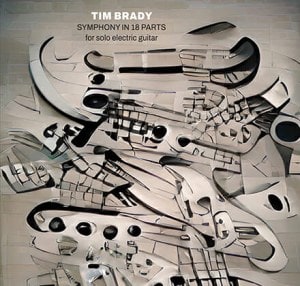The debut recording of Instruments of Happiness (IoH) combines elements of experimental art-rock, chamber music, electroacoustics, orchestral music, and more. This electric guitar quartet was founded by Canadian guitarist-composer Tim Brady, named “One of the 30 most important guitarists for the future of the instrument” by Guitar Player.
Allan Kozinn, in the CD’s Introduction, remarks that the electric guitar’s amplification and sound-shaping possibilities have “given the guitar a kaleidoscopic palette that orchestra players couldn’t have dreamed of. Guitarists can now say, ‘who needs to play in an orchestra – we are an orchestra.’”
The CD premieres two major works from Brady, whose music has been praised as “haunting and explosive” by Gramophone, “highly recommended” by The Wire, and “exuberant” by the New York Times. The CD also offers music from Antoine Berthiaume and Rainer Wiens.
Kozinn comments that “as an exploration of an electric guitar ensemble’s sonic grandeur – and subtlety, too – Brady’s Symphony No. 5, heard in two versions on this disc, is hard to top.”
The first version, The Same River Twice: Symphony #5.0, is a multi-sectioned work scored for the full quartet. Along the way, Kozinn finds “Brucknerian lumbering, a big, deep, chord that wrests the attention… a slow, dreamy haze, rich in melodies… a funky waltz – with occasional hints of 1960s surf guitar [and] an exciting finale.”
The second version, The Same River Twice: Symphony #5.Solo, is written for a single guitarist, performed here by Brady. This piece uses some of the same materials along with new ideas. Kozinn hears a variety of influences: “1970s art-rock guitarists like Manuel Göttsching of the German electronic band Ash Ra Tempel, Steve Hillage of Gong, Steve Howe of Yes, and David Gilmour of Pink Floyd. Brady’s sound is his own, of course, but his flowing, rounded themes evoke the spirits of art-rock experimentalism.”
Antoine Berthiaume’s Fungi explores a slow harmonic ascension in a 6/4 tempo, inspired by Progressive Rock and the music of Ennio Marricone. The work also features an important solo part for the Fender VI bass, a hybrid guitar/bass instrument best known for being used by John Lennon and George Harrison on the “Let It Be” recordings.
Rainer Wiens’ What Is Time? is an exploration of the timbral possibilities of prepared guitar and the use of human breath as the rhythmic determinant. Kozinn describes the work as “a dark, often eerie exploration of space, texture and atmosphere, as compelling as it is unsettled and puzzling.”
About the Composers
Tim Brady
Tim Brady has been at the forefront of creating contemporary classical music for electric guitar for over 25 years. As a performer, he has commissioned and premiered dozens of solo, chamber, and orchestral works with electric guitar, both for his new music ensemble Bradyworks and for a range of other groups. Brady has appeared as a soloist at such venues as The South Bank Centre (London), Radio-France (Paris), The Muziekgebouw (Amsterdam), Merkin Hall (New York), and REDCAT (Los Angeles). His groundbreaking 1997 festival “The Body Electric” was the first-ever international celebration of new music for electric guitar, with 23 concerts in seven cities across North America. Equally active as a composer (with and without guitar), Brady has been commissioned by numerous ensembles, including the Vancouver Symphony, the Orchestre symphonique de Québec, Symphony Nova Scotia, INA-GRM (Radio France), The Relâche Ensemble (Philadelphia), Mutable Music (New York), Topology (Brisbane), The New Orford String Quartet (Montréal/Toronto) and the Opéra de Montréal. He has received Prix OPUS awards for “Composer of the Year” (2004) and “Best New Composition of the Year” (in 2013 for Atacama: Symphonie #3). The New York premiere of Atacama: Symphony #3 at National Sawdust in October 2015 was praised as “radiantly self-mastered… deeply emotive, grounded and elegant” (icareifyoulisten.com).
Antoine Berthiaume
Montreal guitarist/composer Antoine Berthiaume has been active in the improvisation scene for over 15 years. His first release featured him in dialogues with Fred Frith and Derek Bailey. Subsequent albums documented his work with talents such as MaryClare Brzytwa, Elliott Sharp, Michel Donato, and Pierre Tanguay. Berthiaume currently lives in Montreal where he is working on his PhD in electronic music. Photographer Ralph Gibson included him in his review of 81 avant-garde guitarists, which led to a book and an exhibit at the Museum of Fine Arts in Houston.
Rainer Wiens
Rainer Wiens is a musician from the worlds of contemporary jazz and musique actuelle. He has developed an innovative style on prepared guitar, and more recently also plays and composes for lamellaphones. During the ’80s Wiens performed across Canada and in Europe with his jazz group, Silk Stockings. Co-founder of Sound Image Theater, he has composed music for dance, theater, television, and film. Originally from Germany, Wiens lives in Montreal.
About Instruments of Happiness
Tim Brady founded Instruments of Happiness in 2013 to further expand his decades-long exploration of the electric guitar. His interest in the instrument began on February 9, 1964, when the Beatles appeared on the Ed Sullivan show for the first time. Brady comments, “The guitar (and the music) is created to make us happy, sad, contemplative, ecstatic… According to two legendary guitar manufacturers, Robert Godin and Paul Reed Smith (my 2 favourites), you can never be sad with a guitar in your hands. Absolutely, the guitar is an ‘instrument of happiness,’ hence the name for this new ensemble.” IoH comes in three sizes: the quartet, a 20-piece orchestra, and a 100-piece ensemble creating extraordinary site-specific spatialized new works.










